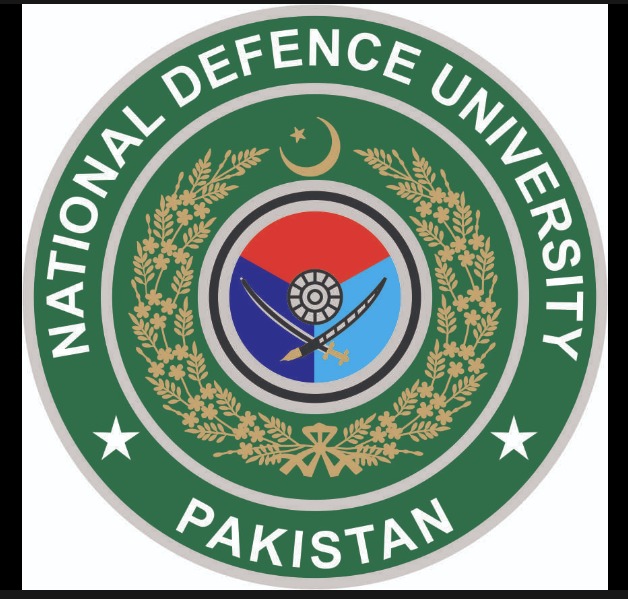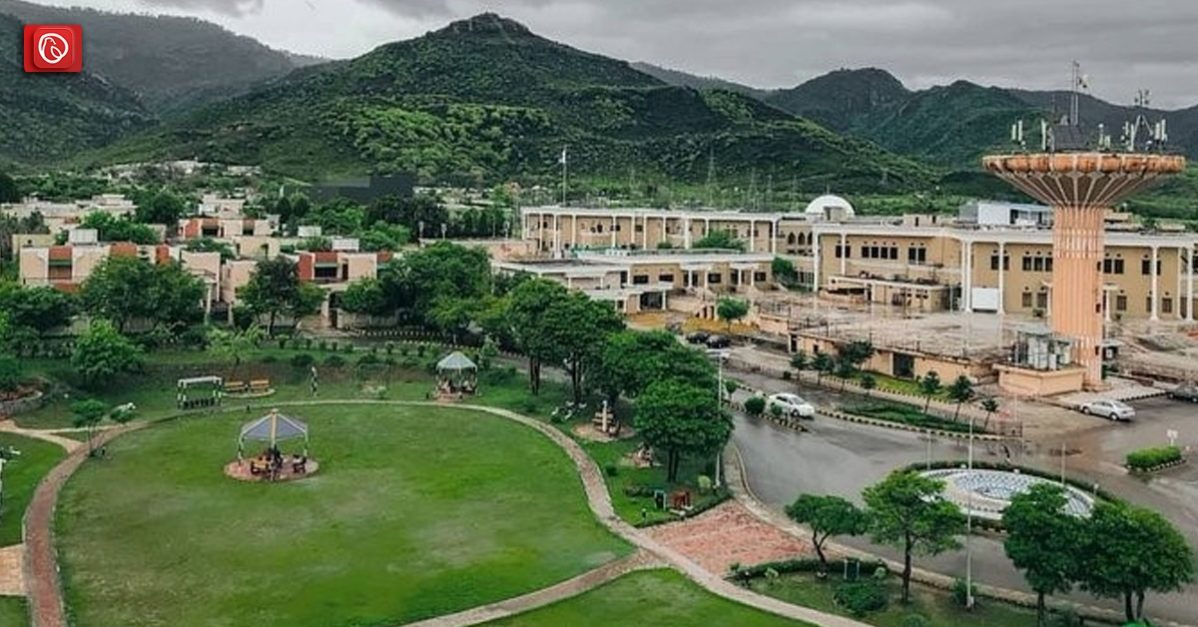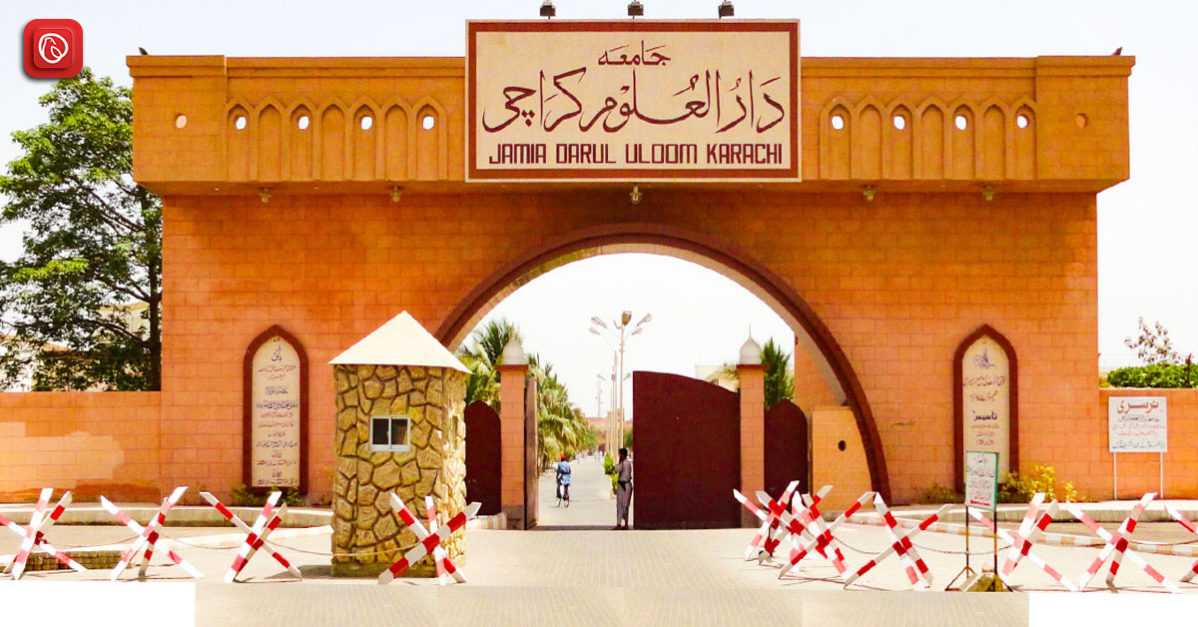National Defense University (NDU) Islamabad is one government-funded university that provides higher education in the field of national security and defence studies. NDU is located in Islamabad and is one of the most prestigious educational institutions in Pakistan
If you are interested in pursuing a career in security and defence studies, you might want to consider applying to the National Defense University (NDU) Islamabad. NDU also offers various academic programs for civilians who want to learn about national security, military strategy, war studies, and other related disciplines.
In this blog, Graana.com has prepared an overview of NDU Islamabad including its history, academic programs and more.
NDU at a Glance
| Category | Information |
|---|---|
| Name | National Defence University (NDU) |
| Former Name | National Defence College |
| Motto | “Taught man which he knew not” |
| Type | Military University |
| Established | 28 May 1970 |
| Affiliation | Pakistan Command and Staff College |
| Pakistan Naval War College | |
| PAF Air War College | |
| Academic Affiliation | Higher Education Commission |
| Chancellor | Arif Alvi |
| President | Lt Gen. Asif Ghafoor |
| Vice-president | RADM Muhammad Shfique |
| Dean | Lubna Abid Ali |
| Academic Staff | 100 |
| Students | 2,000 (1,500 undergraduates, 500 postgraduates) |
| Location | Islamabad, Islamabad Capital Territory, Pakistan |
| Campus | Urban |
| Language | English, Urdu |
| Colors | Green, White, Khaki |
| Website | www.ndu.edu.pk |
| Emphasis | Military education, national security, strategy |
| Notable Alumni | Ashfaq Parvez Kayani, Ehsan ul Haq, Raheel Sharif, |
| Afzal Tahir, Amjad Khan Niazi, Zafar Mahmood Abbasi | |
| Research Focus | National security, defence, strategic studies |
| Academic Faculties | – Faculty of Security Studies |
| – Faculty of Contemporary Studies | |
| – Institute for Strategic Studies, Research & Analysis | |
| – National War Gaming Center | |
| Publications | NDU Journal, Margalla Papers, ISSRA Paper, NDU Monograph, AFWC Journal |
History of NDU

NDU traces its origins to the Army War Course that was introduced in 1963 at the Command and Staff College in Quetta by then-Lieutenant General Sahabzada Yaqub Khan.
The Army War Course was designed to provide advanced training and education to the Army, navy, and Air Force senior officers on war planning and conduct. The course was later renamed as Armed Forces War Course and moved to Rawalpindi in 1970 as a separate institution called the National Defence College (NDC).
NDC Location
The NDC was in the Lalkurti area of Rawalpindi Cantonment and then shifted to various buildings until it was permanently relocated to Islamabad in 1995.
In 2007, the NDC was upgraded to a university status and renamed National Defence University (NDU) after being recognised by the Higher Education Commission of Pakistan. NDU has expanded its academic programs and research activities to cater to the changing needs of the security and defence sector.
Academic Programs of NDU
NDU offers a range of academic programs at undergraduate, graduate, and postgraduate levels for military and civilian students. The academic programs are divided into three main components: the National Security College (NSC), the Armed Forces War College (AFWC), and the Faculty of Contemporary Studies (FCS).
National Security College (NSC)
The NSC is responsible for conducting the National Security and War Course (NSWC), a one-year course for senior officers of the armed forces and civil services who are selected by their respective organisations.
The National Security College aims to prepare the participants for higher command and staff appointments by enhancing their strategic vision, analytical skills, decision-making abilities, and leadership qualities.
The NSWC covers various topics such as national security policy, strategic studies, international relations, regional studies, defence management, wargaming, crisis management, and research methodology.
The National Security College also includes visits to various military and civil institutions, field trips to strategic locations, and interaction with eminent scholars and practitioners.
Armed Forces War College (AFWC)
The AFWC is responsible for conducting the Armed Forces War Course (AFWC), a six-month course for mid-career officers of the armed forces who are selected by their respective services. Armed Forces War College aims to equip the participants with operational-level knowledge and skills for planning and conducting joint operations in conventional and unconventional warfare scenarios.
The AFWC covers various topics such as operational art, joint warfare doctrine, operational planning process, operational law, operational logistics, operational intelligence, information operations, cyber warfare, special operations, peace support operations, disaster management, counter-terrorism, counter-insurgency, and research methodology. It also includes practical exercises, simulations, case studies, seminars, workshops, and visits to operational areas.
Faculty of Contemporary Studies (FCS)
The FCS is responsible for offering various academic programs for civilian students who want to pursue higher education in security and defence studies. The Faculty of Contemporary Studies offers four-year Bachelor of Science (BS) programs in International Relations (IR), Peace and Conflict Studies (PCS), Government and Public Policy (GPP), Strategic Studies (SS), Leadership and Management Studies (LMS), and Mass Communication (MC). The FCS also offers two-year Master of Science (MS) programs in IR, PCS, GPP, SS, LMS, and MC. The FCS also offers MS/MPhil/Ph.D programs in IR, PCS, GPP, SS, and LMS.
| Academic Programs at NDU | Duration |
|---|---|
| Bachelor of Science (BS) Programs | Four years |
| – International Relations (IR) | |
| – Peace and Conflict Studies (PCS) | |
| – Government and Public Policy (GPP) | |
| – Strategic Studies (SS) | |
| – Leadership and Management Studies (LMS) | |
| – Mass Communication (MC) | |
| Master of Science (MS) Programs | Two years |
| – International Relations (IR) | |
| – Peace and Conflict Studies (PCS) | |
| – Government and Public Policy (GPP) | |
| – Strategic Studies (SS) | |
| – Leadership and Management Studies (LMS) | |
| – Mass Communication (MC) | |
| MS/MPhil/Ph.D Programs | Duration varies |
| – International Relations (IR) | |
| – Peace and Conflict Studies (PCS) | |
| – Government and Public Policy (GPP) | |
| – Strategic Studies (SS) | |
| – Leadership and Management Studies (LMS) |
Programs of Contemporary Studies (FCS)
The following are available for graduate and undergraduate programs at NDU Islamabad.
Leadership and Management Studies (LMS)
- BS
- M.Phil
- MS-PM
- Ph.D
Government and Public Policy (GPP)
- BS
- M.Phil
- Ph.D
Strategic Studies (SS)
- BS
- M.Phil
- Ph.D
International Relations (IR)
- BS
- M.Phil
- Ph.D
Peace and Conflict Studies (PCS)
- BS
- M.Phil
- Ph.D
Admission Process of NDU
The admission process to NDU varies depending on the type of course or program you want to apply for.
- To get in NSWC and AFWC courses, you need to be nominated by your respective service or department through a competitive selection process.
- For the FCS programs, you need to apply online through the NDU website and appear for an entry test and an interview.
- The requirement’s for PhD programs, you need to have a relevant master’s degree with a minimum CGPA of 3.0 out of 4.0 or equivalent, pass a GRE-type test conducted by NDU or HEC, submit a research proposal, and clear an interview.
The admission criteria for foreign participants are different from those for Pakistani students. Foreign participants need to have a bachelor’s degree or equivalent qualification from a recognized institution, have a good command of the English language, have relevant work experience in the security or defence sector, submit a letter of recommendation from their respective government or organisation, and obtain a security clearance from their respective embassy or consulate.
Fee Structure
The fee structure of NDU also depends on the type of course or program you enrol in. For the FCS programs, the fee varies according to the level and duration of the study. Following is the fee structure of different programs.
| Fee Outline for Local/Pakistani Students | ||
| Fee Description | BS (Rs) (4 yrs) |
MPhil/MS(Rs) (2 yrs) |
| Admission Charges (One Time) | 40,930 | 67,550 |
| Semester Charger | 67,050×8 | 40,430 x4 |
| Thesis Fee | 13,310 Optional | 26,620 |
| Semester Extension fee (5th Semester) for MPhil/MS | – | 5,000 |
| Semester Extension fee (6th, 7th & 8th Semester) MPhil/MS | – | 10,000 |
| Semester Extension fee (11th Semester onwards for PhD) | – | – |
| Fee Outline for Foreigner FCS Students | |||
| Fee Description | BS (US$) (4 yrs) |
MPhil/MS(US$) (2 yrs) |
PhD (US$) (3 yrs) |
| Admission Charges (One Time) | 1,000 | 625 | 750 |
| Semester Charges | 1,500×8 | 1,250×4 | 1,500×6 |
| Thesis Fee | – | 750 | 2,000 |
| Total Fee for Entire 2/3/4 Years Program | 13,000 | 6,375 | 11,750 |
| Registration/Exam Charges for Additional Courses/Improvement/Repetition Cases (Per Course Fee) | |||
| Fee Description | BS | MPhil/MS | PhD |
| Pakistani FCS Students (Rs) | 6,655 | 7,986 | 7,986 |
| International FCS Students (US$) | 100 | 75 | 75 |
| Pakistani FCS Students (Transfer charges)(Rs.) | 3,310 | 19,965 | 19,965 |
Facilities at NDU Islamabad
NDU Islamabad has state-of-the-art facilities to provide students with an excellent learning experience. The university has a library, computer labs, lecture halls, conference rooms, and sports facilities.
The library has a vast collection of books, journals, and research papers. The computer labs are equipped with the latest technology to provide students with access to online resources and research databases.
The university also has sports facilities, including a gymnasium, tennis court, and swimming pool. These facilities are essential for the physical and mental well-being of students and faculty members.
Conclusion
National Defense University Islamabad is a top institution for Pakistan’s national security and defence. The university’s focus on defence and strategic studies has made it a leading institution in the field.
The university’s academic programs, research centres, and facilities provide students with an excellent learning experience. NDU Islamabad has produced several graduates who have become leaders in the military, government, and academia.
FAQs
Q: Is NDU Islamabad only for military personnel?
A: NDU Islamabad is not only for military personnel. It is open to civilians as well.
Q: What is the ranking of NDU Islamabad?
NDU Islamabad is a specialized university that emphasizes defence and strategic studies.
Q: Does NDU Islamabad offer scholarships?
A: NDU Islamabad offers scholarships to deserving students. The scholarship program is based on merit and financial need. The university also provides financial assistance to students who require it.
Q: What is student life like at NDU Islamabad?
A: Student life at NDU Islamabad is dynamic and diverse. The university has a vibrant student community that participates in various extracurricular activities. These activities include sports, cultural events, and student societies. The university also provides opportunities for students to engage in community service and leadership activities.
Q: What is the faculty like at NDU Islamabad?
A: NDU Islamabad has a highly qualified faculty, consisting of experienced professionals and scholars. The faculty includes retired military officers, academics, and subject matter experts.
If you want to know more about ASRC, Follow Graana.com.




